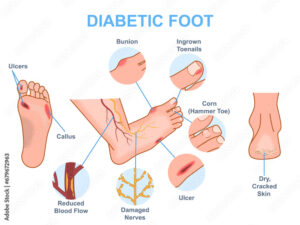Diabetic Peripheral Neuropathy – Everything You Need to Know!
Physiotherapy
Peripheral Neuropathy
Diabetic peripheral neuropathy (DPN) is a common and often painful complication of diabetes, affecting millions worldwide. This blog will get you up to speed on DPN, explaining the causes, symptoms, and treatment – literally, everything you need to know!
What is Diabetic Neuropathy?
Diabetic neuropathy is a type of nerve damage caused by prolonged high blood sugar levels. This condition primarily affects the nerves in their legs and feet, leading to a variety of symptoms that can range from mild discomfort to severe pain.
What Causes Diabetic Neuropathy?
Diabetic neuropathy is a nerve-damaging condition that can occur in people with diabetes. The reasons behind this condition are not simple and involve several factors:
- Prolonged High Blood Sugar Levels: The most significant cause of diabetic neuropathy is persistently high blood sugar levels. When blood sugar levels are consistently high, they can damage the nerves. This damage affects the nerves’ ability to send signals properly, leading to various symptoms like pain, tingling, or numbness.
- Inflammation in the Nerves: Sometimes, the nerves themselves can become inflamed. This inflammation can cause additional damage and contribute to the discomfort and problems associated with diabetic neuropathy.
- Impaired Blood Flow to the Nerves: Good blood circulation is crucial for maintaining healthy nerves. In people with diabetes, the small blood vessels that supply blood to the nerves can become damaged. When these blood vessels don’t work well, the nerves don’t get enough nutrients and oxygen, which they need to function properly.
- Genetic Predisposition: Some people might be more genetically prone to developing neuropathy. This means that due to their genetic makeup, they might be more likely to develop nerve damage when conditions like diabetes are present.
Understanding these factors can help in managing and potentially preventing diabetic neuropathy by controlling blood sugar levels, improving blood flow, and addressing inflammation where possible.
What Causes Neuropathy in Feet?
Neuropathy in the feet often results from high blood sugar levels over time. This condition primarily impacts the tiny blood vessels that supply the nerves, resulting in nerve damage characterised by pain, numbness, or tingling. Additional factors can also play a role in the development of this condition:

- Poor Circulation: Reduced blood flow can further limit the nutrients and oxygen that nerves need to function effectively, worsening the nerve damage.
- Inflammation: Inflammatory conditions can directly affect nerves, leading to or intensifying neuropathy.
- Lifestyle Factors: Smoking and excessive alcohol use contribute significantly to the development of neuropathy. Smoking hampers blood circulation, while excessive alcohol can lead to nutritional deficiencies that harm nerve health.
Diabetic Neuropathy Symptoms
Diabetic neuropathy symptoms can vary widely from person to person. Some common symptoms include:
- Tingling or burning sensation in the feet and legs
- Sharp, jabbing pain or cramps
- Increased sensitivity to touch
- Muscle weakness
- Loss of coordination and balance
- Numbness in the feet and legs
Diabetic Neuropathy Symptoms in Feet
The feet are often the first to show signs of diabetic neuropathy. Symptoms specific to the feet include:
- Persistent pain or discomfort, especially at night
- Loss of sensation, making it difficult to feel temperature changes or injuries
- Ulcers or sores that heal slowly
What is the Best Treatment for Diabetic Neuropathy in Feet?
While there is no cure for diabetic neuropathy, several treatments can help manage symptoms and prevent further nerve damage. The best treatment for diabetic neuropathy in the feet will be assessed by a health professional, but some common treatments include:
- Blood Sugar Management: Keeping blood sugar levels within a target range is crucial for slowing the progression of neuropathy.
- Medications: Pain relievers, anti-seizure medications, and antidepressants can help manage pain.
- Physical Therapy: Exercises can improve strength, balance, and mobility. Mobile services help patients receive treatment in the comfort of their own homes.
- Foot Care: Regular inspection and care of the feet can prevent complications such as infections and ulcers.
In addition to the treatments mentioned above, a comprehensive approach to diabetic neuropathy treatment includes:
- Healthy Lifestyle Choices: A balanced diet rich in nutrients, regular physical activity, and maintaining a healthy weight can improve health and reduce neuropathy symptoms.
- Quit Smoking: Quitting smoking can improve blood circulation and nerve health.
- Supportive Footwear: Wearing shoes that provide good support and cushioning can help protect your feet from injury.
Managing Diabetic Peripheral Neuropathy
Living with diabetic peripheral neuropathy can be challenging, but with the right strategies, it is possible to manage the condition effectively. Here are some practical tips:

- Regular Monitoring: Maintaining blood sugar within recommended ranges can help slow the progression of neuropathy. It’s important to closely follow the diabetes management plan prescribed by your healthcare provider and regularly attend check-ups to adjust the plan as needed.
- Stay Active: Exercise increases blood flow to your limbs and can improve nerve function over time. Activities like walking, swimming, or cycling are especially beneficial and can also help manage blood sugar levels, reducing further nerve damage.
- Healthy Diet: Include whole grains, lean proteins, healthy fats, and plenty of fruits and vegetables in your meals. These foods provide the vitamins and nutrients that nerves need to function optimally. Avoid excessive sugars and fats, which can spike blood sugar levels.
- Stay Informed: Educating yourself about and understanding the potential complications and learning how to recognise signs of diabetic neuropathy is important for timely intervention.
- Foot Care: Inspect your feet daily for cuts, blisters, redness, or swelling. Use comfortable, well-fitting shoes and keep your nails trimmed to prevent injury. If you notice any problems, consult with a healthcare provider promptly to prevent complications.

- Pain Management: For some, neuropathy can be painful. Discuss pain management strategies with your healthcare provider. Options may include medications, topical treatments, or alternative therapies such as acupuncture.
- Stress Management: Managing stress is another important aspect of controlling symptoms. Techniques like deep breathing, yoga, and meditation can help alleviate stress, which may, in turn, help manage pain and blood sugar levels.
Conclusion
By incorporating these strategies into your daily routine, you can manage the symptoms of diabetic peripheral neuropathy more effectively and improve your overall health. Always consult with healthcare professionals to tailor these recommendations to your specific needs.
If you experience any symptoms of diabetic neuropathy, consult your doctor. Early intervention can prevent complications and improve your quality of life. Remember, with proper management, people with diabetes can lead fulfilling lives.
Professional Care for Diabetic Peripheral Neuropathy with Healthproof

If you have been diagnosed with diabetic peripheral neuropathy, we are here to help!
Our team of mobile therapy professionals is dedicated to providing compassionate and effective care tailored to your physical therapy needs across Sydney and Melbourne. Don’t let DPN hold you back—contact us today and book a visit!



